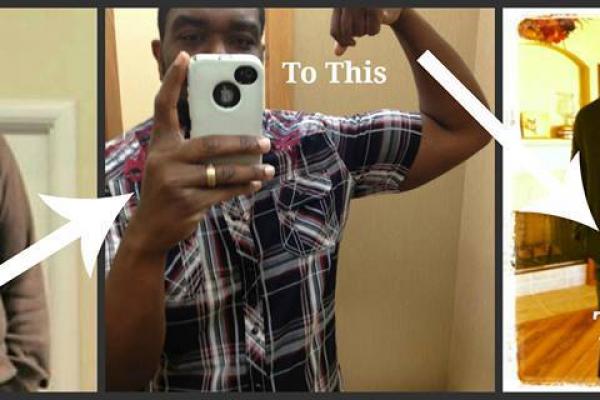Though we have many stories of people whose lives have been made better, few church leaders would argue that far too many people in the pew make significant spiritual transformations even though they’ve spent years in and around churches.
In my other life, I’m a fitness “coach.” I’m not so much a coach as I am an encourager and friend. The unrivaled aspect of working with people to reach their fitness goals is having a front row seat for transformation. We take pictures to note physical transformations, but changes in physique aren’t the most important ones. The most important transformations are spiritual and emotional ones. And quite frankly, the fitness community does transformations better than churches do.
Why?
1. Less Discussion. More Work. In the fitness world, discussion doesn’t go very far. Sure there are magazines and books, but if you don’t do the work and expect transformation to come through knowledge and discussion, everyone will laugh at you. No one goes to “Runner’s World Magazine Study.” While there is much to be gained through knowledge (form, science, technique, etc.), the fitness world knows there’s nothing to be gained by simply acquiring knowledge. Even fitness conventions host daily workouts. The community understands that it’s simply blowing smoke if you don’t do what you talk and teach about. In fitness you either do it or don’t do it. If you don’t do it, don’t expect change. This is not true in the church. I’ve seen church members made leaders and elders on the basis that they made “good comments” in Bible class or “has been here a long time.” In fitness, discussions happen, but work happens more.
2. Conversion Is a Process. After people make a decision to get fit, they are not yet fit. They’ve only made a decision. Next someone needs to commit resources; perhaps new shoes, a gym membership, weights, in-home DVDs, and clothes might need to be purchased. Then the first workout must be done, then another. And another. People who are wise will find a coach, friend, or community to keep them accountable, but physical changes won’t occur until much, much later. It takes weeks of daily hard work before you notice any change, weeks more before family members notice, and still weeks more before friends notice. At some point, you become a “fit person.” The church, on the other hand, believes the hard work has ended at conversion, at decision-making. We then ask very little commitment (especially financial) in order to keep new people around, provide little accountability and then wonder why people fall off the wagon or find little life in the lifestyle.
3. It’s Easy to Get Out of Shape. To remain fit requires a lifetime of discipline. The most fit people workout five-seven days a week and eat clean 95 percent of the time. They understand fitness is a discipline. A few bad meals and a few days without working out can pack on the pounds and atrophy muscles. If you don’t work at it everyday, you will be back out-of-shape fast. Churches, though, expect and encourage very few spiritual disciplines — prayer, fasting, secrecy, etc. In many cases our churches are filled with the spiritually out-of-shape people who are not committed in any meaningful way to the deliberate, on-going practice of spiritual disciplines. As Dallas Willard has said, “Our most serious failure today is the inability to provide effective practical guidance as to how to live the life of Jesus.”
4. It Won’t Be Easy. It Won’t Be Painless. It Won’t Ever Be Over. One of my mentors once said, “American evangelicalism is trying to tell the world that Christianity is cheap, easy, and painless.” However, neither change nor Christianity is ever easy or painless. Your spiritual heroes have all experienced deep and profound pain. As C.S. Lewis has said, “God whispers to us in our pleasures, speaks in our conscience, but shouts in our pain: It is his megaphone to rouse a deaf world.” Transformation requires pain. Be skeptical of anyone who wants to sell you spiritual transformation in “5 Easy Steps…” or “How to ___….” It doesn’t work that way. Never has.
Ultimately, the difference between the fitness community and the church is action. One community expects and demands exertion, the other has made effort optional. The church finds that those who make great efforts inspiring; it gives us something to talk about at Bible study.
But, what if ... ?
What if no one could serve in church leadership unless she or he had a resume filled with the conversion of nonbelievers or service to the community or communities around the world? What if elder selection processes began by asking members: Who would be your first call when you experienced a tragedy? Or when your child was in danger? Or to come pray with you? Who has walked alongside you and inspired you to action in the presence of their example?
What if your church asked everyone to commit to a “Rule of Life” in order to be a member? What if church small groups committed themselves to service to the community and the practice of spiritual disciplines? What if, instead of classes on prayer, we all simply stopped and prayed — for longer than five minutes?
What if youth group retreats were centered on silence and solitude?
What if your church actually practiced the means of transformation — practice, process, discipline, and pain?
Sean Palmer is the lead minister at The Vine Church in Temple, Texas. Author of Scandalous: Lessons in Redemption From Unlikely Women, a contributing writer to the "The Voice Bible" and "Agenda Music: Conversations on Faith and Art with Derek Webb and Friends," and featured author for Wineskins Magazine, Sean blogs regularly at www.thepalmerperspective.com
Got something to say about what you're reading? We value your feedback!
